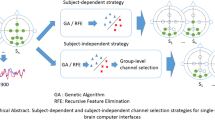Abstract
Channel selection procedures are essential to reduce the curse of dimensionality in Brain-Computer Interface systems. However, these selection is not trivial, due to the fact that there are \( 2^{{N_{c} }} \) possible subsets for an N c channel cap. The aim of this study is to propose a novel multi-objective hybrid algorithm to simultaneously: (i) reduce the required number of channels and (ii) increase the accuracy of the system. The method, which integrates novel concepts based on dedicated searching and deterministic initialization, returns a set of pareto-optimal channel sets. Tested with 4 healthy subjects, the results show that the proposed algorithm is able to reach higher accuracies (97.00%) than the classic MOPSO (96.60%), the common 8-channel set (95.25%) and the full set of 16 channels (96.00%). Moreover, these accuracies have been obtained using less number of channels, making the proposed method suitable for its application in BCI systems.
Access this chapter
Tax calculation will be finalised at checkout
Purchases are for personal use only
Similar content being viewed by others
References
Wolpaw, J.R., Birbaimer, N., et al.: Brain-computer interfaces for communication and control. Clin. Neurophysiol., 113(6), pp. 767–791 (2002).
Farwell, L.A., Donchin, E.: Talking off the top of your head: toward a mental prosthesis utilizing event-related brain potentials. Electroen. Clin. Neuro., 70(6), pp. 510–523 (1988).
Cecotti, H., Rivet, B., et al.: A robust sensor-selection method for P300 brain-computer interfaces. J. Neural Eng., 8(1), p. 016001 (2011).
Krusienski, D.J., Sellers, E.W., et al.: Toward enhanced P300 speller performance. J. Neurosci. Meth., 167(1), pp. 15–21 (2008).
Jin, J., Allison, B.Z., et al.: P300 Chinese input system based on Bayesian LDA. Biomed. Tech., 55(1), pp. 5–18 (2010).
Perseh, B., Sharafat, A.R.: An Efficient P300-based BCI Using Wavelet Features and IBPSO-based Channel Selection. J. Med. Signals Sens., 2(3), pp. 128–143 (2012).
Kee, C., Ponnambalam, S.G., et al.: Multi-objective genetic algorithm as channel selection method for P300 and motor imagery data set. Neurocomputing, 161, pp. 120–131 (2015).
Martínez-Cagigal, V., Hornero, R.: P300-Based Brain-Computer Interface Channel Selection using Swarm Intelligence. Rev. Iberoam. Autom. In., 14(4), pp. 372–383 (2017).
Martínez-Cagigal, V., Hornero, R.: A Binary Bees Algorithm for P300-Based Brain-Computer Interfaces Channel Selection. In: Advances in Computational Intelligence, LNCS, IWANN2017, pp. 453–463. Cádiz, Spain (2017).
Martínez-Cagigal, V., Hornero, R.: Multi-Objective Optimization for P300-Based Channel Selection. In: Proceedings of the 9th CEA symposium, pp. 73–78. Barcelona, Spain (2017).
Sierra, M.R., Coello, C.A.: Improving PSO-Based Multi-objective Optimization Using Crowding, Mutation and E-Dominance. Lect. Notes Comput. Sc., 3410, pp. 505–519 (2005).
Mirjalili, S., Lewis, A.: S-shaped versus V-shaped transfer functions for binary Particle Swarm Optimization. Swarm Evol. Comput, 9, pp. 1–14 (2913).
Acknowledgements
This study was partially funded by projects TEC2014-53196-R of ‘Ministerio of Economía y Competitividad’ and FEDER, the project “Análisis y correlación entre el genoma completo y la actividad cerebral para la ayuda en el diagnóstico de la enfermedad de Alzheimer” (Inter-regional cooperation program VA Spain-Portugal POCTEP 2014–202) of the European Commission and FEDER, and project VA037U16 of the ‘Junta de Castilla y León’ and FEDER. V. Martínez-Cagigal was in receipt of a PIF-UVa grant of the University of Valladolid. The authors declare no conflict of interest.
Author information
Authors and Affiliations
Corresponding author
Editor information
Editors and Affiliations
Rights and permissions
Copyright information
© 2019 Springer Nature Singapore Pte Ltd.
About this paper
Cite this paper
Martínez-Cagigal, V., Santamaría-Vázquez, E., Hornero, R. (2019). A Novel Hybrid Swarm Algorithm for P300-Based BCI Channel Selection. In: Lhotska, L., Sukupova, L., Lacković, I., Ibbott, G. (eds) World Congress on Medical Physics and Biomedical Engineering 2018. IFMBE Proceedings, vol 68/3. Springer, Singapore. https://doi.org/10.1007/978-981-10-9023-3_8
Download citation
DOI: https://doi.org/10.1007/978-981-10-9023-3_8
Published:
Publisher Name: Springer, Singapore
Print ISBN: 978-981-10-9022-6
Online ISBN: 978-981-10-9023-3
eBook Packages: EngineeringEngineering (R0)




